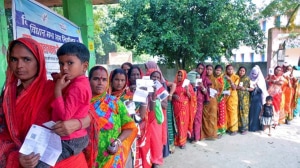SC enters surrogacy debate,asks if an Indian baby is a commodity
With fertility tourism fast becoming a reality,the SC has stepped in to examine if surrogate children of foreign nationals are treated as commodities.
With fertility tourism fast becoming a reality,the Supreme Court on Tuesday stepped in to examine if surrogate children of foreign nationals are treated as commodities.
Do we treat children born out of surrogacy as a commodity? What do the Indian mothers receive for carrying the baby? Now in society we calculate everything by money, a Bench of Justices G S Singhvi and A K Ganguly observed.
The court will also look into whether foreign couples entering into surrogacy agreements in India treat Indian citizenship as a means to get passports for surrogate babies to enable their transit abroad.
The Bench took exception to a Law Commission report which described surrogacy as an industry.
With all due respect to the Law Commission,how can they call something with regard to children as an industry? the court remarked.
Surrogacy was legalised in 2002. But the conditions of surrogacy arrangements are governed by contracts among the parties involved. The contract usually details the terms of consent of the surrogate mother,agreement of her husband and other family members,medical procedures of artificial insemination,reimbursement of all reasonable expenses for carrying the child to full term,willingness to hand over the child born to the commissioning parent(s),etc. A surrogacy operation cost between Rs 1.5 lakh and Rs 10 lakh.
In 2008,commercial surrogacy got a fillip when the Supreme Court allowed Manji or Baby M,conceived from the sperm of a Japanese man and the eggs of an unknown Indian woman with the intervention of a fertility clinic at Anand in Gujarat,to return to Japan.
The apex court is now hearing a petition filed by German couple Jan Balaz and Susane Lohle who want Indian citizenship for their surrogate twins born of a Gujarati woman. The couple have argued that Indian citizenship would help the babies get visas to travel to Germany,which does not recognise surrogacy.
The court said the babies could end up stateless if they were denied entry into Germany. The children will go only after getting an assurance from a competent German authority that they will get proper citizenship in that country, the Bench said.
Opposing the couples plea,Solicitor General of India Gopal Subramanium said Indian citizenship should not be used as a step of temporary nature for a child,or for that matter any person,to get acceptance in another country.
How can law create a citizenship for the purpose of transit? asked Subramanium.
Subramanium criticised the German couple for having entered into a surrogacy agreement without a thought for the fact that the laws of their country did not accept surrogacy.
He said the government had some doubts about the intentions of foreign nationals who opted for surrogacy agreements in India.
There is no difficulty if the persons are Indian,but when it comes to foreign nationals,we have to consider many social dimensions,like that of exploitation of these children. In the end,we have to ask if this is a country where people are going to enter a contract to buy or sell children, Subramanium submitted.
The court agreed with Subramanium that in the absence of a specific legislation or rules to govern the conditions of surrogacy,the judiciary should step in with more safeguards,especially in cases of agreements with foreign nationals.
The court has scheduled the case for hearing on December 17,when the various issues on surrogacy will be framed for hearing.






- 01
- 02
- 03
- 04
- 05
























